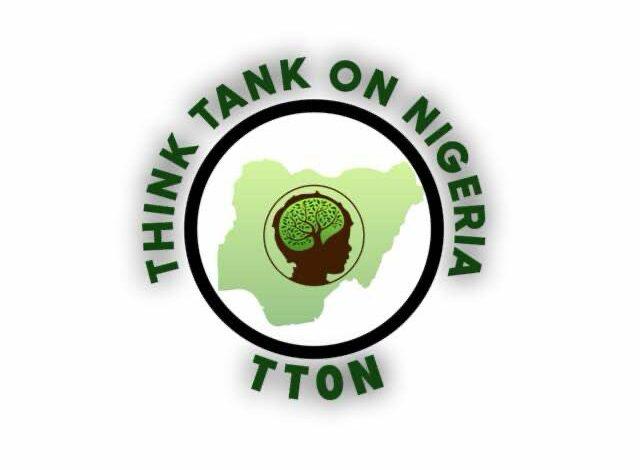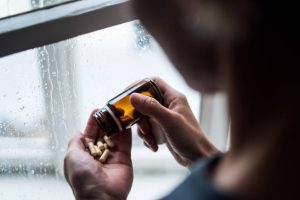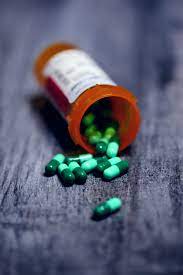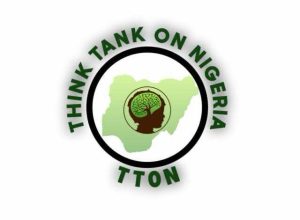
Communique by “Think Tank on Nigeria”, a policy advocacy online platform subject: Substance Abuse. Dated: 28,November 2023
PREAMBLE
The Think Tank on Nigeria (TTON) is a policy advocacy platform with almost 300 members from various professions, representing different geopolitical zones of Nigeria. We discuss and analyse Nigerian policies and politics with the goal of proffering solutions to developmental challenges the country might be facing. Insightful contributions are made by experts in various fields. If adopted, these recommendations have the potential to bring about significant positive changes.
According to the World Health Organization (WHO), substance abuse refers to the harmful or hazardous use of psychoactive substances, including alcohol and illicit drugs. The National Cancer Institute defines substance abuse as the misuse of illegal drugs or the inappropriate use of prescription or over-the-counter drugs or alcohol. Numerous studies by experts and prominent national and international organizations have consistently highlighted the alarming rise in drug use in Nigeria and its damaging consequences.
Today, echoing global concerns, the United Nations Office on Drugs and Crime (UNODC) has noted that many Nigerian adolescents are increasingly unaware of the harmful effects of cannabis and its lasting consequences. In 2019, the 2018 National Drug Use Survey was launched. This joint research by the National Bureau of Statistics (NBS) and the Centre for Research and Information on Substance Abuse (CRISA), with technical support from the UNODC, paints a concerning picture of escalating drug use in Nigeria. The findings show that at the time of the research, 14.3 million Nigerians aged between 15 and 64 years were engaged in drug use. An online publication by Premium Times on August 19, 2021, further affirmed that 40% of Nigerian youth are deeply involved in substance abuse.
This conversation was moderated by the Convener of TTON, Engr. Dideolu Falobi, and cantered around the following questions:

*What are the substances classified as illicit drugs within the context of substance abuse?
- What are the statistics on substance abuse globally and in Nigeria?
- What is the prevalence of substance abuse among youths in Nigeria?
- What factors drive individuals to engage in substance abuse?
- What are the effects of substance abuse on the individual, their family, the surrounding community, and the nation?
- How can one identify an individual who abuses substances?
- What are the risk factors associated with substance abuse?
- How can substance abuse be prevented?
- What challenges hinder accessing treatment for drug abuse and addiction in Nigeria, and how can they be addressed?
OBSERVATIONS
The following observations were made after a comprehensive discussion on the issues related to substance abuse:
- GENERAL OBSERVATIONS
- Substance abuse, commonly referred to as drug abuse, involves the misuse of either legal or illegal drugs for non-therapeutic purposes.
- This issue is a growing concern, negatively impacting individuals, families, communities, and nations at large.
- Typically, it’s defined as the continuous misuse of a psychoactive substance like alcohol or drugs, even when aware of the harmful consequences.
- Substance abuse is often marked by a pattern of persistent usage despite understanding the adverse effects and is categorized as a mental health disorder.
- This issue is prevalent in numerous countries worldwide, including Nigeria, and inflicts a broad spectrum of adverse outcomes on individuals, families, and communities.
- A plethora of substances can be abused, such as alcohol, benzodiazepines, illegal drugs, opiates, sleeping pills, and stimulants. Tobacco products, including cigarettes, cigars, pipes, and smokeless tobacco, are also viewed as substances of abuse.
- Substance abuse can be categorized into two main types: recreational use and drug addiction.
- Recreational use refers to the occasional or experimental use of a drug primarily for enjoyment, while drug addiction is characterized by consistent and compulsive use of a substance despite negative consequences.
- Some individuals consume illicit drugs in excessive amounts for various performance enhancements, including athletes and individuals seeking improved sexual performance.
- Cultural attitudes towards drug use in Nigeria are diverse, often influenced by region and social class. Generally, drug use is regarded as taboo, and individuals who use drugs frequently face stigmatization.
- This stigmatization can create an environment where individuals are hesitant to seek help for substance abuse issues.
- Moreover, certain cultural norms may inadvertently promote the availability of drugs, potentially leading to increased substance abuse rates.
- People living in conditions of poverty or homelessness in Nigeria are especially susceptible to drug abuse due to various challenges. These include limited access to healthcare and mental health services, fewer economic opportunities, and heightened exposure to drug dealers and users.
- Also, individuals facing homelessness or extreme poverty often undergo elevated stress and anxiety levels, which can amplify their vulnerability to substance abuse.
- ITEMS CLASSIFIED AS ILLICIT DRUGS WITHIN THE CONTEXT OF SUBSTANCE ABUSE
Illicit drugs are substances that are illegal to possess or consume in many jurisdictions. Some of the most common illicit drugs globally include cocaine, heroin, ecstasy (MDMA), LSD, methamphetamine, and cannabis (marijuana). Many of these drugs are highly addictive and can lead to severe physical and psychological repercussions when abused. In Nigeria, frequently abused substances encompass alcohol, cannabis, opioids, cocaine, amphetamines, and hallucinogens. Additionally, tobacco contains nicotine, a substance known for its addictive properties.

Alcohol is the most used substance in Nigeria, with an estimated 28.3% of Nigerian adults partaking in heavy episodic drinking. Cannabis (marijuana) ranks second, with a prevalence rate of 8.5%. Opioids also see widespread use, as about 4.2% of Nigerian adults have consumed opioids in the past year. Cocaine, amphetamines, and hallucinogens have a smaller footprint with prevalence rates of less than 1%. Synthetic cannabis, a lab-produced version of natural cannabis, is likewise considered an illicit drug. Additionally, several other substances and prescription drugs are frequently abused in Nigeria. This list includes diclofenac, postinor, felvin, cough syrups containing codeine, ibuprofen, caffeine-laden products like coffee, tetracycline (notably doxycycline), Vitamin C, paracetamol, flagyl, alabukun powder (which contains aspirin and caffeine), ampiclox (composed of ampicillin and cloxacillin), cyproheptadine, lexotan, and tramadol. While most of these substances are intended to be tightly regulated, they remain relatively affordable and can be conveniently acquired over the counter.
- FACTORS THAT INFLUENCE PEOPLE TO ENGAGE IN SUBSTANCE ABUSE
Substance abuse is multifaceted, driven by an array of factors encompassing biological, psychological, and sociocultural dimensions. Numerous determinants are connected to the issue of substance abuse in Nigeria, including socio-cultural elements like traditional and religious beliefs, which might shape an individual’s inclination towards drug use. Some of these factors are:
1.Biological Factors: An individual’s genetic composition and hormonal balance can predispose them to drug addiction.
2.Psychological Factors: Conditions such as depression, anxiety, and low self-esteem can be gateways to substance abuse.
3.Macro-environment Factors: Broader societal elements, like governmental policies, cultural norms, and traditions, play a role.
4.Micro-environment Factors: More localized influences like school environments, religious settings, family dynamics, and a genetic predisposition towards novelty-seeking behaviours can also be contributing factors.
5.Limited access to education and healthcare services often paves the way to substance abuse.
6.Psychological distress, such as stress, anxiety, or depression, can be triggers.
7.An unstable family environment or the absence of family support can act as precursors.
8.Environmental circumstances, like poverty or residing in areas with easy drug availability, can be influential.
- Certain substances, like alcohol and tobacco, are more socially acceptable, making them more accessible and easier to misuse.
10.Among various factors, stress stands out as a pivotal influencer. People may resort to drugs or alcohol as coping mechanisms during stressful periods, viewing them as escapes from negative emotions.
11.Some individuals turn to drugs or alcohol to manage mental health symptoms.
12.Peer pressure is notably influential for teenagers and young adults, pushing them to conform to the habits of their social circles.
13.Genetics plays a role; those with a familial history of substance abuse might be predisposed to it.
14.Experiencing trauma, such as physical or sexual abuse, can increase the risk of substance misuse later. Such traumatic events can induce feelings of helplessness, anxiety, or depression, which people might try to alleviate through substances.
15.Emulating behaviours observed in admired “role models” can lead to substance use, as posited by Bandura’s social learning theory.
16.Aspirational reasons, such as wanting to align with a particular group, seeking fame or respect, or trying to ascend the social ladder, can motivate substance use. Cult groups, for instance, might encourage substance abuse.
17.Lack of content filtering on social media platforms can expose users to drug-related information, sometimes driven by algorithmic suggestions.
- The casual acceptance and normalization of drug use for recreation might increase its prevalence.
A significant deterrent is the widespread lack of awareness about the potential risks of drug use.
19.Among the youth, there’s a diminished perception of risk associated with substance use.
- Enforcement of drug-related laws is often lax.
21.There are societal pressure compelling individuals to use drugs.
22.Early exposure to drugs can set the stage for later abuse.
- SIGNS OF SUBSTANCE ABUSE IN LOVED ONES
1.Observable changes in behaviour, such as mood swings.
2.Sudden and unexplained irritability or short temper.
3.Altered physical appearance, which might include weight loss, bloodshot eyes, or visible track marks from injections.
4.Neglecting responsibilities like missing work, school, or family gatherings.
5.A shift in sleeping patterns, either battling insomnia or oversleeping.
6.Exhibiting secretive behaviours, isolating from family and friends.
7.Unexpected financial struggles, possibly from spending on drugs.
8.Declining performance in work or academic settings.
9.A diminishing interest in activities or hobbies they previously enjoyed.
10.Unusual odours on their breath, body, or clothes.
11.Having drug or alcohol-related paraphernalia.
12.Mysteriously disappearing for extended periods.
13.Noticeable changes in eating habits.
14.Overlooking personal hygiene.
15.Fading enthusiasm for activities they once loved.
16.Displaying slurred speech or appearing disoriented.

Building close relationships based on trust and love can be crucial in identifying if a family member, friend, sibling, or parent is grappling with substance abuse. Teenagers, especially those without proper guidance, are at a heightened risk as they navigate the complexities of adolescence. This vulnerability can lead them to adopt detrimental habits from their peer group. For parents, it’s crucial to forge a bond with their teens during these formative years, sharing anecdotes from their own youth and actively discussing their children’s lives, aspirations, and challenges. Offering encouragement and support can help steer teenagers towards healthier decisions. Moreover, parents should embody the behaviours and values they wish to instil in their children. Leading by example can be the most powerful lesson.
1.Parents should strive to act as friends rather than authority figures to their teenagers during this pivotal stage. Adolescence can be daunting, and without proper guidance, young individuals might feel isolated and lost.
2.By engaging in open dialogues and sharing personal stories from their own teenage years, parents can offer insights into managing relationships and balancing academic pursuits with personal aspirations.
3.It’s crucial for parents to provide encouragement, especially during trying times. The goal should be to establish a foundation of trust, enabling children to confide any issues, including those related to substance abuse.
- COMPARISON OF DRUG ABUSE IN NIGERIA TO OTHER AFRICAN COUNTRIES
Nigeria ranks second in drug abuse rates in Africa, only surpassed by South Africa. Cannabis, opioids, stimulants, and sedatives are among the most abused drugs in Nigeria. Factors such as poverty, unemployment, and the widespread availability of illicit drugs largely drive drug abuse in the country. Compared to neighboring countries, Nigeria witnesses relatively higher instances of drug-related crime and violence.
- REGIONAL VARIATIONS OF DRUG ABUSE WITHIN NIGERIA
While drug abuse in Nigeria mirrors trends observed in other African nations—focusing on substances like marijuana and heroin—Nigeria’s rates surpass those of many other African countries. There’s also been a notable surge in the misuse of prescription drugs recently. The drug abuse landscape in Nigeria is influenced by various regional factors, including cultural and social determinants, the specific drugs in question, the demographics of the users (like age, gender, and socio-economic status), among others.

1.For instance, cannabis and heroin consumption is more dominant in the Northern regions of Nigeria. In contrast, the Southern regions report higher usage of opioids, prescription drugs, stimulants, and synthetic drugs.
- In the Northern regions of Nigeria, khat (an amphetamine-like stimulant), hashish, and cannabis are the predominant drugs of abuse. In contrast, the Southern regions show a higher inclination towards cocaine, heroin, and psychotropic drugs.
3 The most urbanized and industrialized states have elevated drug abuse rates, with the South-South and South-East regions reporting the highest prevalence.
4 Certain socio-economic groups, notably the unemployed, homeless, and those living in poverty, show higher tendencies towards drug abuse.
5 Regions like the Niger Delta demonstrate increased drug abuse rates, which can be attributed to the presence of organized crime syndicates and drug trafficking organizations.
6 Areas affected by conflict also register higher instances of substance abuse.
7 Injection-based drug consumption is more prevalent in the Southern regions, while inhalation-based drug use is more commonly observed in the North.
- IMPACT OF SUBSTANCE ABUSE ON INDIVIDUALS, FAMILIES, COMMUNITIES, AND THE NATION (NIGERIA)
Substance abuse poses significant challenges and is recognized as a severe public health concern affecting individuals, families, communities, and nations globally. In Nigeria, this issue is escalating, with statistics indicating a rising trend in drug usage, especially among at-risk demographics such as the impoverished, the homeless, and rural inhabitants.
Substance abuse profoundly impacts an individual’s physical, mental, and socio-emotional health:
1.At the personal level, substance abuse can trigger a cascade of problems, including mental health disorders, employment issues, homelessness, depression, anxiety, cognitive impairments, and criminal behavior.
2.Physically, substance abuse can induce a variety of health complications like liver diseases, heart conditions, and other organ damage.
3.Substance abuse reverberates through the family unit, often resulting in strained relationships, disruption of familial harmony, economic hardships, and both emotional and psychological trauma. This can exacerbate feelings of isolation and loneliness for all involved.
4 Substance abuse adversely impacts the immediate community, cultivating an environment of fear and mistrust, and often correlates with rising crime rates.
5 Communities affected by substance abuse witness increased crime, growing poverty, and compromised public safety.
6 On a national scale, substance abuse can inflate healthcare expenses, cause productivity losses, and stunt economic growth.
7 For Nigeria, the repercussions of substance abuse span reduced productivity and a decline in overall public health and safety.
8 Social ramifications also manifest in the form of higher school dropout rates, interruptions in professional careers, and strained marital relationships.
- METHODS OF PREVENTING AND ERADICATING SUBSTANCE ABUSE
Preventing and eradicating substance abuse necessitates a holistic approach, engaging a broad spectrum of stakeholders: individuals, families, community organizations, law enforcement bodies, healthcare professionals, and governmental entities. Addressing the root causes and key contributing factors is pivotal. Several tactics have proven effective, prominently centring around education about the perils of substance abuse. Strategies encompass:
1.Enhancing access to education and healthcare services in underserved communities.
2.Expanding economic opportunities for populations at risk.
3.Healthcare professionals play a pivotal role by offering addiction treatments, advocating preventive methods, and initiating evidence-based public health interventions.
4.Early identification and intervention are crucial. Healthcare providers can pinpoint individuals susceptible to substance abuse and provide timely assistance.
5.Implementing strategies designed to curtail drug demand is another effective measure.
6.Creation of treatment and rehabilitation programs is essential.
7.Collaborating with law enforcement can aid in curtailing drug-related crimes.
8.It’s crucial to have referral systems in place for individuals seeking assistance.
9.Medical professionals can also guide on harm reduction strategies, direct individuals to relevant treatment services, and offer supportive care to those grappling with substance abuse.
10.By setting clear boundaries, actively engaging in their children’s lives, and exemplifying responsible behaviour, individuals and families can play a role in mitigating substance abuse.
11.Families can instil structure and guidance, serving as a support system that helps individuals steer clear of drug temptations.
12.Community organizations can be pivotal by offering support, education, linking individuals to resources, and advocating for policy revisions.
13.Raising public awareness about the risks of substance abuse and crafting holistic drug policies that emphasize prevention, treatment, and rehabilitation is key.
14.Public education about the hazards of substance misuse needs amplification.
15.Enhancing the accessibility to treatment facilities and rehabilitation services is paramount.
16.Implementation and fortification of effective laws and regulations concerning substance abuse can target drug traffickers and others embedded in the drug industry.
17.Facilitating access to community support services can provide the necessary assistance.
18.Promoting education, job opportunities, and social activities can create a healthy environment.
19.Fostering an environment conducive to positive behaviour is essential.
20.Drug control programs can play a pivotal role in minimizing drug availability.
- CHALLENGES IN ACCESSING TREATMENT FOR DRUG ABUSE AND SOLUTIONS IN NIGERIA
Several barriers hinder the access to treatment for drug abuse and addiction in Nigeria. These include limited facilities, a gap in public awareness, financial constraints, and societal stigma. Addressing these challenges requires:
1.Amplifying public awareness and education.
2.Enhancing accessibility by establishing more treatment centres.
3.Formulating more effective public health policies.
4.Reinforcing existing policies and regulations.
5.Ensuring accessibility to treatment and rehabilitation services.
6.Offering support and resources for individuals affected by substance abuse.
7.Elevating awareness of available treatment options and extending financial aid to those in need.
8.Ensuring accessibility to essential services, educational opportunities, and job openings, especially for at-risk populations. Moreover, it’s crucial to mitigate the stigma surrounding drug abuse.
- THE ROLE OF LAW ENFORCEMENT AGENCIES IN PREVENTING DRUG ABUSE AND ADDICTION IN NIGERIA
Law enforcement agencies are pivotal in combating drug abuse and addiction in Nigeria. Their roles encompass:
1.Enforcing laws related to drug trafficking and illegal drug activities.
2.Collaborating with community entities, healthcare providers, other government departments, and NGOs to roll out public health campaigns. These initiatives aim to educate the public about the dangers of drug misuse.
3.Assisting individuals in accessing treatment and support services.
4.Targeting drug traffickers and dealers by organizing raids, performing surveillance, and relaying intelligence to local law enforcement entities.
5.Detaining and prosecuting individuals involved in the unlawful sale and distribution of narcotics.
6.Enhancing collaboration between different agencies.
7.Launching drug prevention and awareness campaigns.
8.Boosting surveillance and intelligence operations.
9.Instituting drug courts and establishing diversion programs.
10.Strengthening border security measures.
- CURRENT POLICIES AND PROGRAMS IN NIGERIA TO COMBAT DRUG ABUSE AND ADDICTION
To effectively address drug abuse and addiction in Nigeria, sustained efforts and a multi-sectoral approach are indispensable. Strict enforcement of policies, paired with appropriate penalties for offenders, is essential to maintain the policies’ effectiveness. Nigeria has put forth several strategies and programs to combat drug abuse and addiction.

These include:
1.The National Drug Law Enforcement Agency (NDLEA): Tasked with enforcing drug laws, arresting drug traffickers, confiscating illicit drugs, and coordinating drug control measures in Nigeria, the NDLEA also collaborates with other governmental entities to educate and raise awareness about the risks of drug consumption. While they spearhead investigations, prosecutions, and drug interdictions, they are often hampered by challenges such as corruption, outdated equipment, and a limited ability to counter the advanced and ever-changing world of drug trafficking.
2.The National Agency for Food and Drug Administration and Control (NAFDAC): This agency is vested with the responsibility of regulating the sale and distribution of drugs, ensuring that pharmaceuticals meet quality standards and are safe for consumption.
3.The National Drug Control Master Plan: This strategic document delineates the government’s tactics and interventions designed to mitigate drug abuse, tackle drug trafficking, and illicit drug trade. It also underscores the provision of treatment and care for individuals battling addiction, aiming to curb both the demand and supply of illicit drugs. This master plan seeks to comprehensively reduce the rate of drug abuse in Nigeria.
4.The National Drug Demand Reduction Programme (NDDRP): Concentrating on prevention, treatment, and rehabilitation, the NDDRP strives to address the root causes and manifestations of drug abuse.
5.National Council on Drug Abuse: Tasked with coordinating and overseeing drug control initiatives in Nigeria, the Council formulates policies and programs to combat drug abuse. It provides essential support to individuals, families, and communities adversely affected by drug abuse.
6.Drug Treatment and Rehabilitation Centres: These have been established to offer care and support for individuals struggling with drug addiction. These facilities provide services like detoxification, counselling, and psychosocial assistance. Regrettably, there’s an evident shortage of these centres across Nigeria, and a significant number are deficient in proper infrastructure, competent staff, and uniform treatment protocols.
7.The Federal Ministry of Health: This body is charged with granting access to treatment and rehabilitation services for victims of substance abuse. Furthermore, in coordination with other governmental departments and NGOs, the ministry champions public health campaigns and educational initiatives about the perils of drug consumption.
8.Additional Initiatives: Initiatives like the National Strategic Plan on HIV/AIDS, National Drug Abuse Advisory Council (NDAC), National Action Plan on Drug Abuse (NAPDA), National Anti-Drug Campaign (NADC), and Drug Abuse Treatment and Rehabilitation Centre (DATRC) play significant roles.
9.International Collaboration: Nigeria engages in cooperative endeavours with international entities like the United Nations Office on Drugs and Crime (UNODC) and the Economic Community of West African States (ECOWAS) to tackle drug abuse and addiction. Such collaborations encompass capacity building, information exchange, and regional collaboration to counter transnational drug trafficking. Yet, obstacles such as restricted resources and disjointed coordination amongst various agencies and nations persist.
- THE INFLUENCE OF INTERNATIONAL DRUG POLICIES ON DRUG ABUSE IN NIGERIA
International drug policies and regulations considerably shape the drug abuse landscape in Nigeria. Such policies can constrain the accessibility, quality, and purity of certain narcotics. Furthermore, international drug protocols can sometimes restrict access to treatment, rehabilitation services, and medication-assisted treatments.
- CHALLENGES IN TACKLING DRUG TRAFFICKING AND ILLICIT DRUG TRADE IN NIGERIA
Combatting drug trafficking and the illicit drug trade in Nigeria presents intricate challenges, attributed to:
1.Law enforcement initiatives being impeded by corruption, ineffective strategies, and limited resources and funding.
2.The substantial financial incentives for organized crime groups and drug cartels to persist in the illicit drug trade.
3.The well-organized and well-funded nature of drug trafficking organizations, complicating efforts to counteract them.
4.The proclivity of drug trafficking groups to operate in secluded, rural regions, complicating detection, and interruption of their activities.
5.Traffickers often employ advanced tactics to dodge detection, such as modifying drug chemicals or utilizing deceptive labels to hide the drugs’ true nature.
6.A disjointed effort between governmental entities, pervasive corruption, and a deficient political resolve to tackle the issue.
7.A general lack of public cognizance regarding the perils of drug trafficking and the illicit drug trade, coupled with the absence of comprehensive data.
- ETHICAL CONSIDERATIONS IN TREATING DRUG ADDICTS IN NIGERIA
Administering treatment to individuals with drug addiction in Nigeria is laden with ethical considerations:
1.Upholding the autonomy of the person, ensuring confidentiality, and delivering safe, effective care.
2.Guaranteeing access to adequate facilities and resources for individuals.
3.Treating individuals with the utmost dignity and respect.
4.Safeguarding the privacy of the medical data of individuals.
5.Offering appropriate resources to those impacted by substance abuse.
6.Furthermore, healthcare professionals must endeavour to equip individuals with the requisite knowledge to make well-informed decisions concerning their treatment.
7.Healthcare providers must strictly follow ethical guidelines when prescribing medications and addressing requests for support.
8.Ensuring non-discrimination and upholding respect for human rights.
9.Protection of vulnerable populations.
10.Adhering to the professional standards of care.
11.Responsible prescribing and utilization of medications.
12.Evading conflicts of interest.
- EVOLVING TRENDS IN DRUG ABUSE IN NIGERIA OVER TIME
Drug abuse and addiction trends in Nigeria have notably evolved over time. Notably, in recent years, there’s been a rise in substance abuse prevalence, especially among the youth.
1.While the use of cannabis has generally declined, there’s been a surge in the consumption of opioids and stimulants.
2.A noticeable shift in drug preferences is evident, with an uptick in the abuse of prescription medications, synthetic drugs like methamphetamine, and opioids such as heroin and fentanyl.
3.Historically, there’s been a strong societal stigma linked to drug use and addiction, often perceived as a sign of moral decadence or criminal inclination. Such stigmas deter individuals from seeking treatment or admitting to their addiction. Consequently, this can foster discrimination and alienation from familial and community support structures, perpetuating a cycle of substance abuse. Additionally, this barrier complicates the individual’s journey to accessing necessary resources for sustained recovery.
4.Nonetheless, recent times have witnessed a growing acceptance of recreational drug use, especially among the younger generation.
5.There’s a prevailing cultural leniency towards drug consumption, which can inadvertently escalate rates of drug abuse and addiction. Many perceive drug use as a coping mechanism for life’s challenges, often seen as an instant solution to problems. Such perspectives can augment drug consumption, making it challenging for those grappling with addiction to seek timely intervention.
6.The cultural and social factors influencing drug use have evolved, with aspects like poverty, peer pressure, and the accessibility of drugs playing an even more substantial role in persuading individuals to indulge in substance use.
7 This shift in attitudes has resulted in an upswing in the incidence of drug use in Nigeria, especially among the younger generations.
- THE EFFECTIVENESS OF DRUG TREATMENT AND REHABILITATION PROGRAMS IN NIGERIA
The efficacy of drug treatment and rehabilitation programs in Nigeria differs, but they are generally successful in aiding individuals to conquer their addictions and pursue wholesome, productive lives. Typically, the triumph of drug treatment and rehabilitation initiatives hinges on multiple elements: the kind of treatment offered, the program’s duration, and the care quality, which is intrinsically linked to resource availability.
In essence, drug treatment and rehabilitation strategies prove valuable in guiding individuals to cut down drug consumption, bolster mental health, and secure long-term sobriety while mitigating relapse risks. However, a deeper exploration is warranted to gauge the enduring success of these strategies within Nigeria.
The accomplishment of treatment and rehabilitation hinges significantly on an individual’s dedication to recuperation. Treatment regimens usually encompass both individual and group counselling sessions coupled with medication-assisted treatments. These methodologies aim to facilitate individuals in discerning the root causes behind their addiction, fostering techniques to handle temptations and cravings.
Rehabilitation initiatives might further incorporate skills training, job placements, and additional resources to assist individuals in assimilating back into the community. Research indicates that treatment regimens which holistically address the physical, psychological, and societal dimensions of recovery are the most potent in propelling individuals towards sustained sobriety. Furthermore, these programs effectively curb relapse rates and enhance life quality. Evidence suggests that those engaged in such treatment initiatives tend to maintain abstinence and lead fulfilling lives.
KEY RESOLUTIONS/CONSENSUS OUTCOME

During the discussion, several potential solutions for curbing drug abuse in Nigeria were spotlighted. These are as follows:
1.A primary measure in preventing and eradicating substance abuse entails heightening awareness about the hazards associated with drug consumption. Achieving this involves spearheading public health campaigns and educational drives especially tailored for the youth.
2.Education emerges as a pivotal instrument in the fight against substance abuse. Through informed educational initiatives, individuals garner the knowledge and acumen necessary for making enlightened choices about drug consumption. Furthermore, education aids in diminishing stigma while fostering a deeper comprehension of the triggers and repercussions of substance abuse.
3.It’s paramount to furnish easily accessible drug treatment and rehabilitation avenues for those grappling with substance abuse. Comprehensive offerings should encompass counselling, therapeutic interventions, group support sessions, and the facilitation of medication-assisted treatments.
4.Additionally, ensuring that those battling substance abuse have pathways to gainful employment and housing is crucial. Furthermore, the introduction of activities serving as alternatives to drug use can be beneficial.
5.Mobilizing community support can act as a bulwark against substance abuse. A cohesive community not only offers individuals a sense of belonging but also orchestrates a safe and nurturing environment. Such supportive communities are adept at pinpointing individuals at the brink of substance abuse, furnishing them with the requisite resources and backing during their recuperation phase.
6.Both governmental and spiritual figureheads should ardently champion education and awareness drives highlighting the perils of substance abuse to individuals and the larger community. Initiatives should commence early, integrating substance abuse awareness modules into academic curricula spanning primary schooling to university levels and also permeating religious sanctuaries.
7.Embracing early intervention measures can drastically curtail the onset of substance abuse. By catering to at-risk individuals and swiftly identifying and rectifying budding concerns, the severity and progression of issues can be halted.
8.Treatment remains an indispensable ally in the quest to prevent and obliterate substance abuse. Holistic treatment not only equips individuals with the tools and support essential for rehabilitation but also significantly diminishes chances of relapse.
9.Elevating awareness regarding the risks associated with drug consumption.
10.Offering easily accessible drug treatment and rehabilitation services.
11.Enhancing opportunities for meaningful employment and housing provisions.
FOOTNOTE: You want to share story with us? You want to advertise with us? You need publicity for product, or service, or event? Contact us on WhatsApp +2348073463653 or email penpushing@yahoo.com







